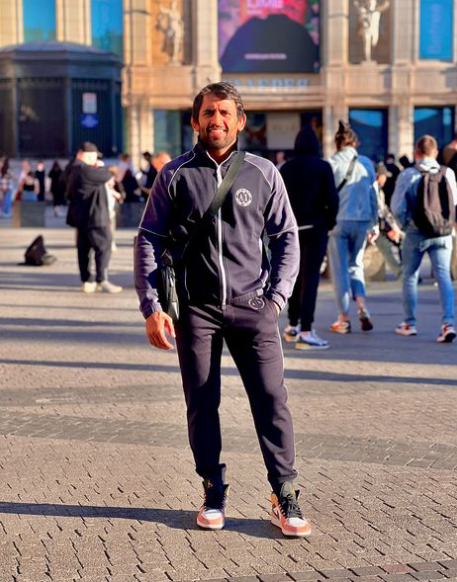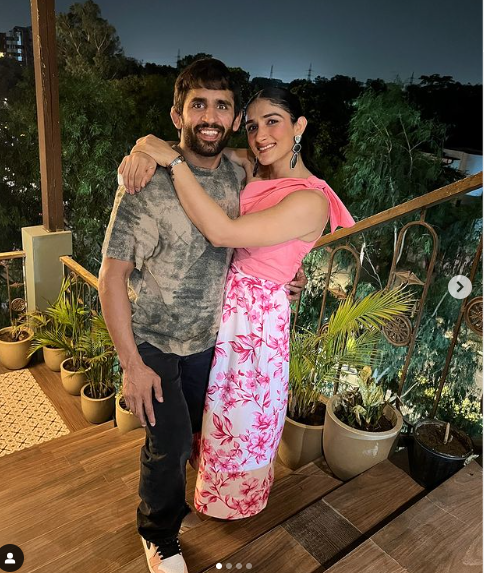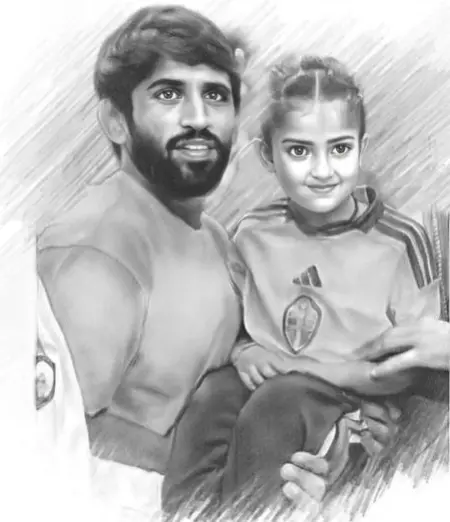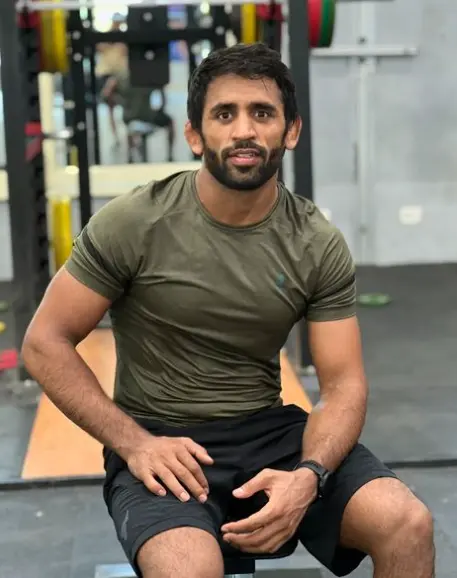Who is Bajrang Punia

Bajrang Punia is a prominent Indian wrestler celebrated for his exceptional achievements on the global stage. Born on February 26, 1994, in Khudan village, Haryana, Punia has become a symbol of excellence in freestyle wrestling. He hails from a wrestling family and began his journey under the guidance of his father, Balwan Singh Punia, and coach, Shako Bentinidis. Bajrang’s rise to prominence began with his success in junior competitions, where he showcased his potential early on.
Punia’s breakthrough came in 2013 when he won a bronze medal at the World Wrestling Championships. This victory marked the start of an illustrious career, with his performances consistently earning him accolades and recognition. He gained further acclaim by securing a gold medal at the 2018 Commonwealth Games in Gold Coast and another gold at the 2018 Asian Games in Jakarta, solidifying his status as one of India’s top wrestlers. His achievements on the mat include multiple medals at the World Wrestling Championships, reflecting his dominance in the 65 kg weight category.
Bajrang Punia’s most significant achievement came when he qualified for the Tokyo 2020 Olympics, where he won a bronze medal, becoming one of the few Indian wrestlers to medal in the Olympics. His dedication to the sport, technical skill, and competitive spirit have earned him accolades and admiration both in India and internationally.
Beyond his wrestling prowess, Punia is known for his advocacy for sports development and his commitment to inspiring young athletes. His journey from a small village to the global wrestling arena is a testament to his hard work, resilience, and the growing prominence of Indian wrestling on the world stage. Bajrang Punia continues to be a source of inspiration, embodying the spirit of excellence and perseverance.
Bajrang Punia wiki
| Profession | Wrestler |
| Height | 5.5 inches (166)cm |
| Eye colour | Black |
| Hair colour | Black |
| Events | freestyle |
| Coach | Sujeet maan |
| Medals | gold-Commonwealth Championship Singapur (65)kg 2016, Commonwealth Championship Brakpan (65)kg 2017, Asian indoor and martial arts games Ashgabat (70)kg 2017, Asian championship New Delhi (65)kg 2017, Asian games Jakarta (65)kg 2018, Commonwealth games gold coast (65)kg 2018, Asian championship Xi ‘an (65)kg 2019, Commonwealth games Birmingham (65)kg 2022. Silver-Asian championship Astana (61)kg 2014, Asian Games Incheon (61)kg 2014, world U23 Championship Bydgoszcz (65)kg 2017.World Championship Budapest (65)kg 2018.Asian Championship New Delhi (65) kg 2020.Asian Championship Almaty (65)kg 2021.Asian Championship Ulanbator (65)kg 2022. Bronze-Asian Championship New Delhi (60) kg 2013.World Championship Budapest (60)kg 2013.Asian Championship Bishkek (65)kg 2018.World Championship Nur Sultan (65)kg 2019, Olympic Games Tokyo (65)kg 2020, Bolat Turlykhanov Cup Almatry (65)kg 2022. |
| Awards | :2015 Arjuna award :2019 padma Sri award |
| Political Party | Indian National Congress (INC) |
| Political journey | Joined Indian National Congress September 2024″ Appointed the all-India Kisan Congress working chairman in September 2024 |
| Date of birth | 24 February 1994 Saturday |
| Age | 30 years |
| Birthplace | Khudan, Jhajjar ,Haryana India |
| Nationality | Indian |
| Home town | Khudan, Jhajjar, Haryana india |
| Collage/University | The regional center of the Sports Authority of India SAI Sonipat, India |
| Qualification | Wrestling training at the original Centre Sports Authority of India SAI Sonipat, India |
| Hobbies | Dancing |
| Marital Status | Married |
| Marriage date | 25 Nov 2020 |
| Wife | Sangeeta Punia |
| Father name | Balvan singh Punia |
| Mother name | om Pyari Punia |
| Siblings | Brother-Harendra Punia |
| Favourite food | Churma |
| Favourite sports | basketball, football and river rafting |
| Favourite Wrestler | Yogeswar Dutt, Captain Chandrup |
Bajrang Punia Age

Bajrang Punia, born on February 26, 1994, is currently 30 years old. This celebrated Indian wrestler hails from the Jhajjar district of Haryana and has gained widespread recognition for his exceptional achievements in freestyle wrestling. At 30, Bajrang has already made a significant mark in the world of sports, having won multiple international medals, including gold in the Commonwealth Games and the Asian Games. His journey from a small village in Haryana to becoming a global wrestling icon is inspiring. Age has played a crucial role in Bajrang Punia’s career, as his experience, discipline, and rigorous training have helped him stay competitive on the global stage. At 30, he is in the prime of his wrestling career, combining youthful energy with the wisdom and technique that comes with years of dedication to his sport. Bajrang’s age reflects his maturity, and his performances demonstrate that he is at the peak of his physical and mental abilities, striving to bring more glory to India in the coming years. Despite being 30, Bajrang Punia continues to push the boundaries, staying committed to his sport, which promises many more memorable victories ahead. As he approaches future competitions, his age is a testament to his long-standing dedication and a motivator to continue excelling. His determination and relentless spirit make him an enduring symbol of Indian wrestling, proving that with passion and hard work, age is just a number in the pursuit of excellence.
Bajrang Punia height
Bajrang Punia stands at a height of 5 feet 5 inches (165 cm), which is considered average for a wrestler, but his stature doesn’t define the powerhouse of talent and strength he carries. His relatively compact height has been an advantage in wrestling, allowing him to have a lower centre of gravity and better control over his movements in intense matches. Bajrang Punia’s height has played a significant role in shaping his wrestling style, characterized by quick movements, excellent agility, and the ability to manoeuvre his opponents with remarkable ease. Despite not being tall, he uses his physicality to his benefit, excelling in freestyle wrestling, where speed, balance, and technique are far more crucial than sheer size.
At 165 cm, Bajrang has proven time and again that success in wrestling comes from a combination of skill, strategy, and perseverance, rather than just height. His compact frame enables him to get into low positions during a match, allowing him to swiftly attack or defend, depending on the situation. It’s this unique advantage that has helped him dominate at the international level, securing medals in prestigious events like the Commonwealth Games, Asian Games, and World Wrestling Championships.
Bajrang Punia’s height also helps him maintain an exceptional level of stamina and endurance. Wrestling, being a sport that requires immense physical conditioning, relies heavily on a wrestler’s ability to sustain strength and energy throughout a bout. Bajrang’s build allows him to train rigorously while managing his weight, which is critical in his 65 kg weight category. Despite not being the tallest athlete on the mat, his performance and relentless determination make him stand tall as one of India’s finest wrestlers. His height, far from being a limitation, has been a tool that, combined with his hard work and technical skills, has elevated him to the top of the wrestling world.
Bajrang Punia Weight
Bajrang Punia competes in the 65 kg weight category, and his weight is a crucial aspect of his success in freestyle wrestling. Maintaining his weight within this limit requires immense discipline, as wrestling is a sport where even the slightest fluctuation can impact performance and competitiveness. Bajrang’s ability to maintain his ideal weight through rigorous training and a strict diet has been key to his dominance on the mat. Competing in the 65 kg category, he faces opponents who are often equally strong and agile, making weight management a significant part of his strategy to stay at the top of his game.
The 65 kg weight class in wrestling demands a perfect balance between strength, agility, and endurance, and Bajrang Punia has mastered this balance. His intense training routines, which include strength-building exercises, cardio, and wrestling drills, are designed to keep him fit and within the required weight limit. Additionally, Bajrang follows a disciplined diet plan, focusing on high-protein, low-fat foods that fuel his body without adding extra weight. This level of commitment to maintaining his weight has allowed him to remain competitive at the highest levels, winning medals at prestigious events like the Commonwealth Games, Asian Games, and World Wrestling Championships.
Competing in a specific weight category requires more than physical training— mental toughness. Bajrang has to constantly monitor his weight, ensuring that he does not exceed the 65 kg limit while maintaining the strength and energy needed for gruelling matches. His ability to manage his weight effectively has been one of the cornerstones of his career, allowing him to compete at an elite level without sacrificing performance. Bajrang Punia’s dedication to staying in the 65 kg weight class demonstrates his professionalism and commitment to wrestling, making him one of India’s most respected and accomplished athletes.
Bajrang Punia Diet
Bajrang Punia’s diet plays a critical role in his success as an elite wrestler, helping him maintain peak physical condition and stay within the 65 kg weight category. His diet is carefully crafted to provide him with the energy, strength, and endurance needed to perform at the highest level while also ensuring he doesn’t exceed his weight limit. Bajrang’s diet is high in protein, which helps him build and maintain muscle mass crucial for wrestling. Sources of protein in his diet include lean meats like chicken and fish, as well as vegetarian options like paneer, lentils, and eggs, which help his body repair and strengthen muscles after intense training sessions.
In addition to protein, Bajrang includes complex carbohydrates in his meals, such as whole grains, brown rice, and oats, to fuel his rigorous workouts. These carbs provide him with sustained energy during his long training hours and help replenish glycogen levels post-exercise. Fresh fruits and vegetables are also a staple in his diet, supplying him with essential vitamins, minerals, and antioxidants that aid in recovery and keep his immune system strong, especially when he is training or competing internationally.
Bajrang Punia’s diet also focuses on staying hydrated, which is key to maintaining endurance during intense physical activity. He drinks plenty of water throughout the day and includes natural electrolytes, such as coconut water, to ensure his body remains hydrated and balanced. Additionally, healthy fats like those from nuts, seeds, and olive oil are part of his diet, providing the necessary fatty acids for joint health and overall well-being.
To maintain his weight, Bajrang avoids junk food, sugary snacks, and processed foods, which can lead to weight gain and affect his performance. His strict but well-rounded diet, combined with his disciplined lifestyle, ensures that he stays fit, agile, and strong, ready to compete at the highest levels of international wrestling. This careful balance of nutrition supports his physical and mental strength, making him one of India’s finest athletes.
Bajrang Punia Networth
Bajrang Punia, one of India’s most accomplished wrestlers, has gained fame and substantial financial success through his illustrious career. As of 2024, Bajrang Punia’s net worth is estimated to be around $2 million (INR 16 crore). His primary source of wealth comes from wrestling championships, brand endorsements, and government rewards. Having represented India in multiple international tournaments, including the Olympics and World Wrestling Championships, Bajrang has earned significant prize money. He won a bronze medal at the 2020 Tokyo Olympics, which brought him national recognition and substantial cash rewards from both the Indian government and various state governments. In addition to his earnings from sports, Bajrang has also been a favorite for brands, endorsing companies like Asics and Tata Motors, which further boosts his income.
Moreover, his consistent performances at high-profile events like the Asian Games and Commonwealth Games have led to several lucrative endorsement deals. With a fanbase that respects his dedication to the sport and his down-to-earth personality, he has become a marketable athlete in India. Bajrang’s financial success is not only reflective of his wrestling prowess but also of his smart financial decisions and public appearances. He has invested wisely in properties and other ventures, ensuring long-term financial security. The wrestler’s discipline and hard work on the mat are mirrored in his financial planning off the mat, making him a role model for aspiring athletes.
Despite his wealth, Bajrang Punia remains grounded and continues to focus on his wrestling career. His net worth is expected to grow as he competes in more tournaments and signs additional endorsement deals. Overall, Bajrang Punia’s net worth is a testament to his success both in the wrestling arena and in the business world, solidifying his status as one of India’s premier athletes.
Bajrang Punia Wife

Bajrang Punia’s wife, Sangeeta Phogat, is a prominent Indian wrestler and a member of the famous Phogat family, known for its legacy in wrestling. Sangeeta was born on March 5, 1998, and is the youngest daughter of Mahavir Singh Phogat, a respected wrestling coach whose story inspired the popular Bollywood film Dangal. Like her sisters Geeta, Babita, and Ritu, Sangeeta developed a passion for wrestling from a young age and dedicated herself to achieving excellence in the sport. Her marriage to Bajrang Punia on November 25, 2020, united two of India’s most respected wrestling families, blending traditions, values, and a shared commitment to sportsmanship.
As a national-level wrestler, Sangeeta has won various titles and continues to train, balancing her career with her support for Bajrang. The couple shares a deep understanding of the physical and mental challenges that come with competitive wrestling, allowing them to motivate and encourage each other. They frequently share glimpses of their journey on social media, showcasing their commitment to their sport and each other. Despite their demanding schedules, Bajrang and Sangeeta find time to support one another’s goals and celebrate each other’s accomplishments, creating a strong foundation of mutual respect and admiration.
Their relationship is admired by fans who see them as a power couple in Indian sports, representing resilience, dedication, and unity. As they continue to make strides in wrestling, Bajrang and Sangeeta’s partnership symbolizes the strength and perseverance that define champions, both on and off the mat. Their journey together not only inspires aspiring athletes but also highlights the importance of balancing personal and professional aspirations within a marriage.
Bajrang Punia Family

Bajrang Punia hails from a humble yet supportive family rooted in the village of Khudan in the Jhajjar district of Haryana, India. His family played a pivotal role in shaping his wrestling career, with his father, Balvan Singh Punia, being a former wrestler himself. Balvan recognized Bajrang’s potential at a young age and encouraged him to pursue wrestling, even making significant sacrifices to ensure Bajrang received proper training. His mother, Om Pyari Punia, has been a constant source of emotional support, always standing by her son throughout his journey, offering encouragement during tough times and celebrating his victories.
Bajrang grew up in a family environment where wrestling was more than just a sport; it was a way of life. His family’s love for the sport and their deep connection to the traditional Indian form of wrestling, or “kushti,” made it a natural path for him to follow. Bajrang also has a brother, Harender Punia, who shares a close bond with him. The strong family ties and their unwavering belief in his potential motivated him to excel in the sport despite financial hardships early in his career.
In 2020, Bajrang married Sangeeta Phogat, a well-known wrestler from the famed Phogat family. The Phogat sisters, including Geeta and Babita Phogat, have achieved national recognition in wrestling, making Bajrang’s marriage to Sangeeta a union between two wrestling dynasties. Sangeeta has been an important pillar of support in Bajrang’s personal and professional life, sharing his passion for wrestling and understanding the challenges of an athlete’s life.
Bajrang Punia’s family remains an integral part of his success story, from his early training days to his Olympic triumphs. Their sacrifices, love, and belief in his abilities have helped him reach the pinnacle of Indian wrestling, and he continues to honor them through his dedication to the sport.
Bajrang Punia Controversy
Bajrang Punia, despite being one of India’s most celebrated wrestlers, has not been entirely free from controversy. One of the most notable incidents occurred in 2023 when he became involved in a high-profile protest against the Wrestling Federation of India (WFI) and its then-president, Brij Bhushan Sharan Singh. Bajrang, along with several other prominent Indian wrestlers, including Vinesh Phogat and Sakshi Malik, accused Brij Bhushan of sexual harassment and mismanagement of the wrestling body. This controversy shook the Indian sports community, drawing widespread media attention and public outrage. Bajrang Punia, who had always been seen as a disciplined and dedicated athlete, emerged as a vocal leader of the protest, advocating for the rights of athletes and seeking justice for the victims.
The protests garnered support from various corners of society, with many athletes and political figures backing the wrestlers’ demands for an investigation. Bajrang’s involvement in the protest was significant as it highlighted the power imbalance within sports federations and brought to light the plight of athletes who often remain silent out of fear of repercussions. However, the controversy also attracted criticism, with some questioning the timing of the protest, especially as it coincided with major international tournaments like the Asian Games and Olympic qualifiers. Critics argued that Bajrang and other athletes should have focused on their preparations rather than getting involved in the protest.
Despite the criticism, Bajrang Punia remained firm in his stance, emphasizing that justice and athlete welfare were more important than any single competition. His role in the protest was seen as a bold move, challenging the established power structures in Indian sports. The controversy ultimately led to an investigation into the allegations, with the matter being taken up at the national level. Although the protest temporarily disrupted his training, Bajrang’s commitment to both his sport and the cause of athlete welfare demonstrated his leadership and courage in standing up for what he believed was right.
Bajrang Punia Achievements

Bajrang Punia is one of India’s most decorated wrestlers, with a career marked by numerous achievements on the global stage. A true champion in the 65 kg freestyle wrestling category, Bajrang has consistently represented India in major international competitions, bringing home medals and glory. One of his most remarkable achievements came at the 2020 Tokyo Olympics, where he won a bronze medal, solidifying his status as one of the country’s finest wrestlers. His Olympic success followed years of hard work, and it made him a household name across India. Prior to his Olympic triumph, Bajrang had already made his mark by winning three World Wrestling Championship medals—silver in 2018 and two bronze in 2013 and 2019—showing his consistency at the highest level of competition.
Bajrang has also been a dominant force in the Asian wrestling circuit. He won gold medals at both the 2018 and 2022 Asian Games, further establishing himself as a top competitor in the sport. Additionally, he has claimed multiple gold medals at the Commonwealth Games, securing victories in 2018 and 2022. His dominance in the Commonwealth arena earned him widespread respect, as he became a symbol of Indian wrestling excellence.
Aside from his medals, Bajrang Punia’s achievements extend to being honored with prestigious awards. He has received the Arjuna Award, the Rajiv Gandhi Khel Ratna Award, and the Padma Shri, India’s fourth-highest civilian award, recognizing his immense contribution to sports.
Bajrang’s success is a testament to his dedication, discipline, and relentless pursuit of excellence. Despite facing tough competition, he continues to inspire the next generation of Indian athletes with his grit and determination. With several years of competitive wrestling ahead of him, Bajrang Punia is poised to add even more accolades to his already impressive list of achievements, cementing his legacy in Indian sports history.
Bajrang Punia Biography

Bajrang Punia is an Indian freestyle wrestler who has become a symbol of determination and excellence in Indian sports. Born on February 26, 1994, in Khudan village, Jhajjar district, Haryana, Bajrang grew up in a family where wrestling was deeply ingrained. His father, Balvan Singh Punia, a former wrestler, encouraged him to pursue the sport from a young age. Bajrang began his wrestling training at just seven years old and quickly showed promise, participating in local and regional competitions. His talent caught the attention of renowned wrestling coaches, and soon, Bajrang was training at the prestigious Chhatrasal Stadium in Delhi, under the guidance of coach Mahabali Satpal Singh.
Bajrang’s wrestling career took off when he started competing internationally in the 65 kg freestyle category. He made his first major breakthrough by winning a bronze medal at the 2013 World Wrestling Championships. This was the start of a glittering career that saw him win numerous accolades. Bajrang went on to secure silver at the 2018 World Championships and added another bronze in 2019, establishing himself as one of the best wrestlers in the world. His crowning achievement came at the 2020 Tokyo Olympics, where he won a bronze medal, bringing pride to the entire nation.
In addition to his world championship successes, Bajrang has dominated the Asian Games and Commonwealth Games, winning multiple gold medals. He claimed gold at both the 2018 and 2022 Asian Games, and his back-to-back golds at the 2018 and 2022 Commonwealth Games further showcased his consistency and dominance in the sport.
Beyond his sporting career, Bajrang has been recognized with some of India’s highest sporting honors, including the Arjuna Award, Khel Ratna Award, and Padma Shri. His dedication, hard work, and humility have earned him respect not just in India but globally. Married to fellow wrestler Sangeeta Phogat, Bajrang Punia continues to be an inspiration to aspiring athletes and a shining example of perseverance and excellence in Indian wrestling.
